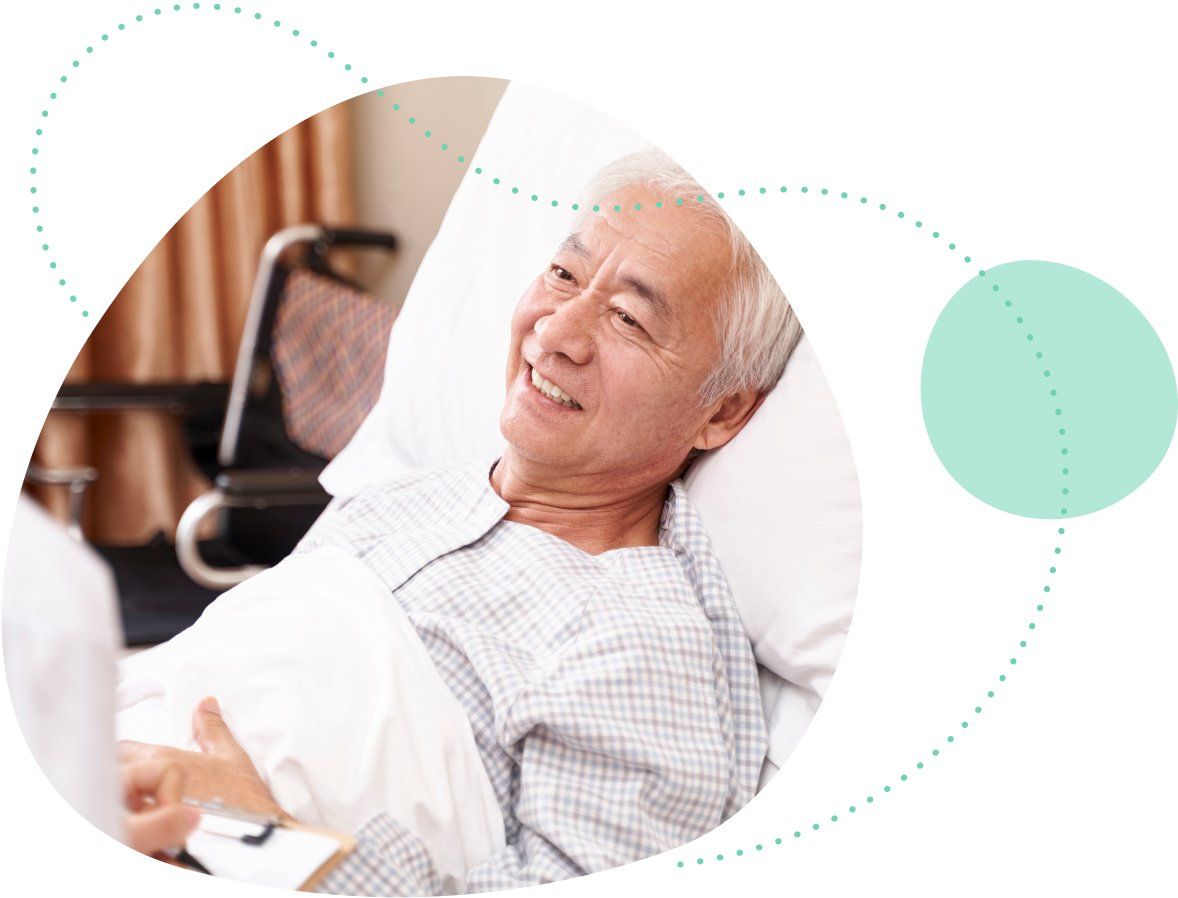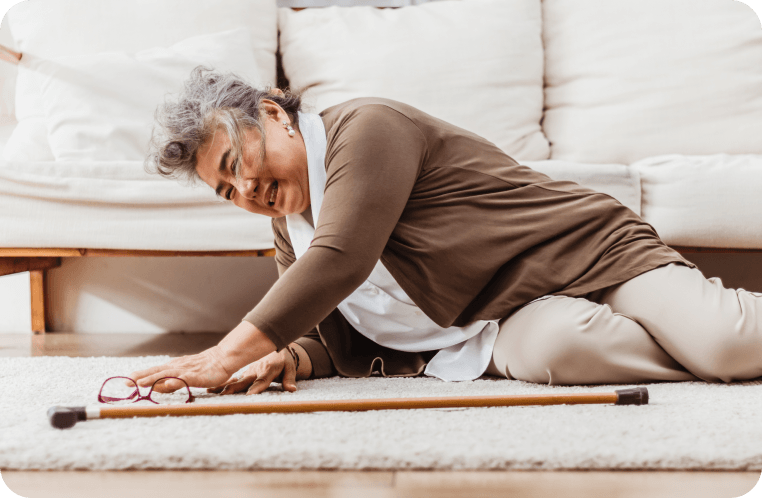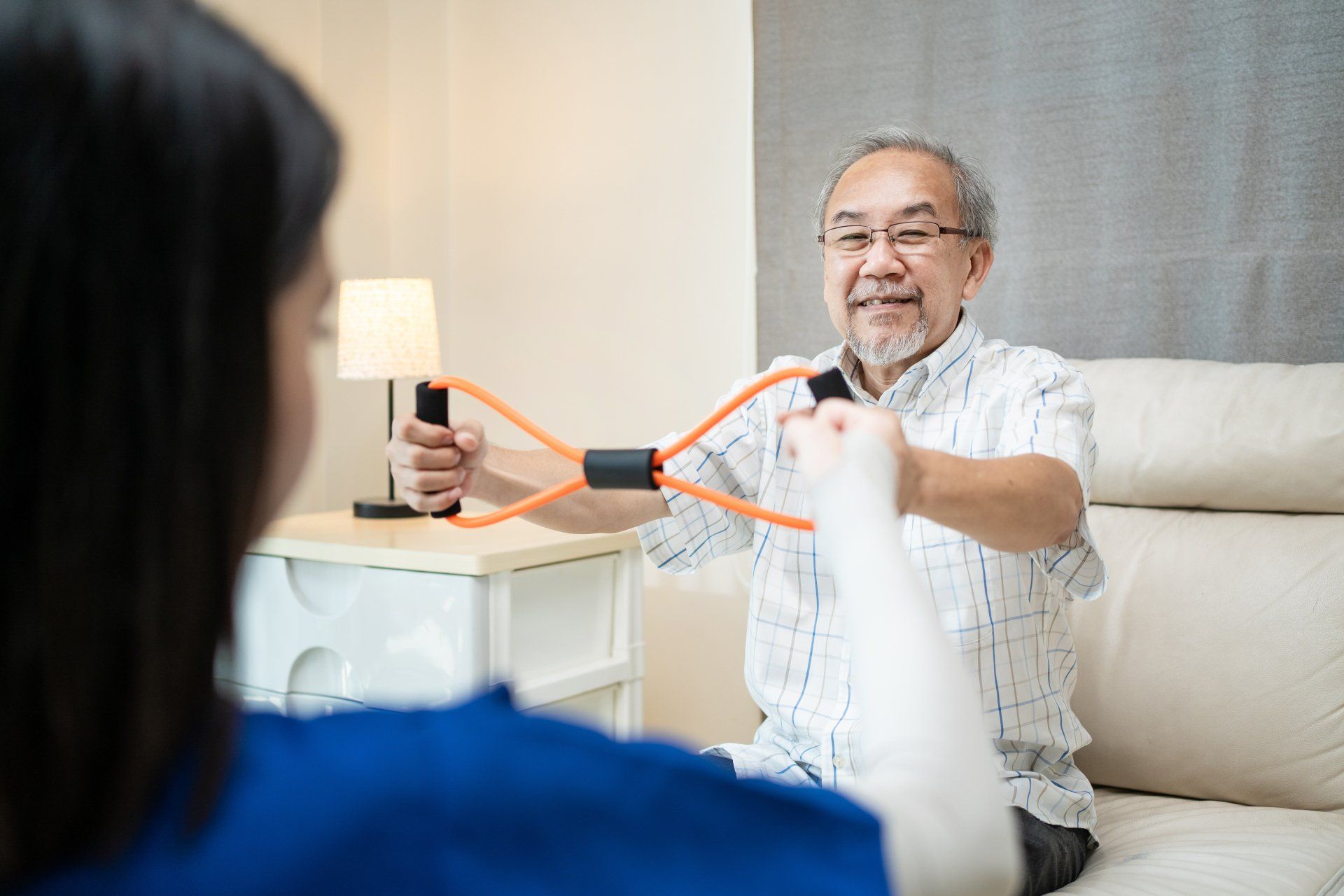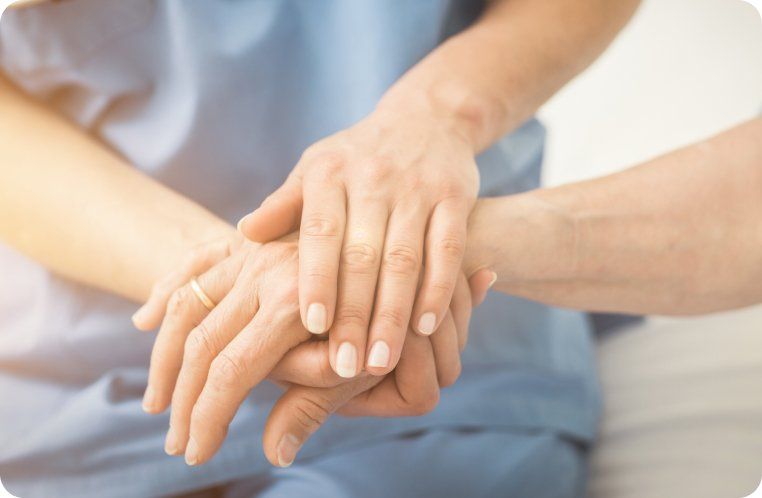| specialised care
Stroke Care AT HOME
A stroke can create significant change in one's daily life. Evercare's approach is to help your loved one regain a sense of normalcy through a personalised rehabilitation plan and professional prevention methods. Delivering recovery and therapeutic care at home can minimise patients' post-stroke side effects and damage, so that they can feel comfortable as they heal.
A Timeline of Stroke Recovery
Depending on the areas of the brain that has been affected by stroke, a patient can experience difficulty with walking, balancing, swallowing and communicating. The road to recovery may require working with different medical professionals, such as physiotherapists, occupational therapists, speech therapists, and nurses. No matter where your loved one is in their journey, help and guidance from Evercare are always available. See how our stroke care services fit into their treatment plan.*
Initial Recovery
The stroke rehabilitation process starts from the hospital assessment and a hospital stay. Then it can continue in the safety, comfort and convenience of the patient's home.
Five-Six Weeks
The first five to six weeks of rehabilitation involves intense and frequent physical treatment. Patients can skip the extra transition between facility and home, with in-home nursing care and physiotherapy.
Three Months
We expect to see rapid improvement in the first three months. The main goal during this golden period of stroke recovery is to help the patient adapt to any after effects and restore physical functioning.
Six Months +
After six months, improvements are possible but will be much slower. This may mean a full recovery for some, or residual stroke symptoms or ongoing after effects for others. Patients will need to continue to work with their care team to prevent a secondary stroke.
*Each stroke case is different and recovery will look different for every patient. This timeline acts as a rough guide of what to expect.
Phase 1
Initial Recovery
Your loved one is probably at their most fragile at this stage. Stroke in elderlies can often lead to physical and mental setbacks, and simultaneously create pressure on family members in the long run. A variety of complications can affect two thirds of stroke patients, making recovery a highly unpredictable process. Careful hospital discharge planning and assistance with daily living will be the primary focus of rehabilitation.
At this stage, you can count on us for:
- Assistance with daily living (feeding, bathing, lifting)
- A customised post-stroke care plan to manage complications
- Monitoring of vital signs
- Physical, occupational and speech therapy
- Dysphagia therapy
- Mental and family support
Who can help:
Provide round-the-clock personal care such as diapering, bathing, and lifting. Massage therapy can also be provided to bed-bound patients to relieve muscle pain.
React quickly to any sudden post-stroke complications, and create a discharge care plan to facilitate a smooth transition from hospital to home.
Help your loved one set stroke rehabilitation goals, assist with home modifications, teach swallowing exercises and improve speech difficulties.
Phase 2
Five-Six Weeks
The first five to six weeks require the steepest learning curve, along with intensive physical therapy. The process can also take a toll on your family, as you are thrusted into these new roles and responsibilities.
At this stage, you can count on us for:
- Assistance with daily living (feeding, bathing, lifting)
- Physical, occupational and speech therapy
- Dysphagia therapy
- Respite Care
- Medicine reminders and administration
Who can help:
Provide close supervision to prevent falls and assist in daily tasks to help the patient regain a better quality of life.
Provide professional stroke rehabilitation and nursing care, including monitoring the patient's vital signs, preventing bedsores, and providing medication reminders.
Provide intensive physiotherapy through coordination and balance exercises at home, in order to help stroke patients and elderlies regain mobility.
Phase 3
Three Months
As rapid improvements occur, there is a chance that patients will experience setbacks, like pneumonia or a second stroke. Particularly for elderlies, it is important to take advantage of the golden period during the first 3 months to engage in therapeutic exercises to reduce any physical and mental damages. Families will need to work closely with physiotherapists, occupational, and speech therapists to adjust rehabilitation goals together.
At this stage, you can count on us for:
- Assistance with daily living (feeding, bathing, lifting)
- A customised rehabilitation plan to manage complications
- Monitoring of vital signs
- Physical, occupational and speech therapy
- Dysphagia therapy
- Diet consultation
Who can help:
Assist with daily activities, provide diet guidance, and aid with feeding to reduce risk of aspiration or malnutrition.
Monitor the patient's vital signs, provide guidance on preventing a second stroke, and educate the family on how to manage any possible complications.
Provide in-home speech therapy by strengthening muscles in the mouth and conducting swallowing exercises, so that the stroke patient can improve language barriers.
Phase 4
Six Months +
While most improvements should have happened by this point, it is important to continue discussions with your care team to help prevent a second stroke and facilitate better recovery progress at home. Elderlies with long-term illnesses are at higher risk for a stroke recurrence, and will therefore need to improve their living habits with a healthy diet and physical activity.
At this stage, you can count on us for:
- Assistance with daily living (feeding, bathing, lifting)
- Monitoring of vital signs
- Diet consultation
- Physical, occupational and speech therapy
- 24/7 coma and paralysis care
- Long-term care for bedridden patients
Who can help:
Provide daily assistance, diet guidance, and companionship during the last stretch of recovery.
Manage any residual side effects and take steps to prevent a future stroke. Provide around-the-clock coma and paralysis care when needed.
Provide direction on home modifications and proper installation of equipment to allow stroke patients to transition back to everyday life.
FIND PROFESSIONAL NURSING CARE FOR STROKE PATIENTS
Fill in your contact information and one of our care specialists will reach out to you within 24 hours.
TIPS FROM EVERCARE'S HEALTH EXPERTS
PREVENTING Pneumonia AFTER A STROKE
How We Ensure Highest Quality Of Care
| Vetted Qualifications
Our care professionals are highly trained, trustworthy and professional. We ensure they have been interviewed and screened.
| Disinfection Protocols
We use only hospital-quality disinfection procedures in your home.
| Transparent Communication
We regularly keep you informed on your loved one's status.
| Personalised Care Plan
Our nurses create a tailored care plan for you, so you know what needs to be done and how.





